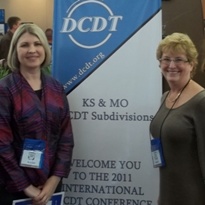eLearning Matters
 Sharon Stone, a doctoral student in the EPPL program, and Dr. Sharon deFur, professor of special education, presented Postsecondary Students and Technology Accessibility: Comparing Groups with and without eLearning Experience at the 16th International Conference of the Division on Career Development and Transition, October 12-15 in Kansas City, Missouri.
Sharon Stone, a doctoral student in the EPPL program, and Dr. Sharon deFur, professor of special education, presented Postsecondary Students and Technology Accessibility: Comparing Groups with and without eLearning Experience at the 16th International Conference of the Division on Career Development and Transition, October 12-15 in Kansas City, Missouri.
The presentation was based on findings from a survey study that measured perceptions of technology accessibility among community college students with disabilities. Questions in the survey focused on web-based student services, online courses, and technology-enhanced traditional class formats.
The main finding from the study is an interaction between race and amount of technology used in high school. African American students at the community college rated technology accessibility significantly lower than did Caucasian students, even though both groups reported using more than five different types of academic technology in high school.
Although it is impossible to determine the cause of this difference based on the survey results, it is clear from the literature that the types of activities students engage in with technology contribute to levels of success in technology-enhanced learning. Students who use technology to support higher-order skills, such as research and collaboration, tend to fare better overall.
With that in mind, Ms. Stone and Dr. deFur encouraged workshop participants to offer students with disabilities as many opportunities as possible to work with instructional technology in high school or earlier. However, special educators and transition counselors need to make sure students do more than simple drill-and-practice. The best option is participating in at least one online course before reaching college. In the absence of school or district support for online learning, teachers can build their own web-based learning modules. The presentation concluded with a demonstration of various Internet tools available for this purpose.